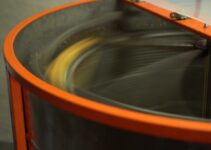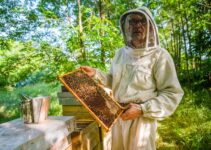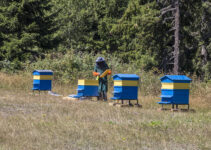Beekeeping is subject to umbrella state laws and specific municipal laws in your region. Alabama has state laws governing the beekeeping industry, but municipalities can impose stricter measures for keeping bees in urban and suburban areas within their jurisdiction. What are the legal requirements regarding beekeeping in Alabama?
Beekeeping laws in Alabama are strict in comparison to some other states in the US. The strict rules are to curb the spread of bee pests and diseases to protect the thriving beekeeping industry in Alabama. All hives must be registered with the state, and all bee movements must be authorized.
As will all states in the USA, Alabama has laws and regulations concerning the keeping of bees to protect the local environment and local bee species and protect the public from the danger posed by bees. All Alabama beekeepers must adhere to these laws and any additional municipal by-laws regarding keeping bees in built-up areas.
Laws For Keeping Bees In Alabama
Alabama has a humid subtropical climate, which is ideal for keeping bees. The southern areas of the state have warmer, more humid conditions due to the influence of the Gulf of Mexico, while the northern regions are cooler and less humid.
The mild winters across the state make beekeeping a year-round activity in Alabama, with the bees remaining fairly active in the winter season.
The ideal climate in Alabama has led to a thriving beekeeping industry in the state, and the state has imposed rules to protect the industry and prevent the spread of pests and diseases in bee colonies.
Alabama is known as the “Cotton State” due to cotton being one of the largest crops grown in the region. While cotton is self-pollinated, bees can increase the yield of the cotton plants. This has contributed to the success of beekeeping in the state.
Alabama has fairly strict regulations for beekeeping in the state, most of which apply to hobbyists and professional beekeepers alike.
All Beekeepers Must Register Colonies And Apiaries In Alabama
Every beekeeper must undergo a registration process in the state of Alabama, regardless of whether you are a hobbyist or a professional beekeeper, own 1 beehive, or 1000 bee hives.
The registration must be completed by way of a form where each colony or apiary its location must be indicated on the registration form.
The form must be completed and submitted to the Commissioner of Agriculture by the 1st of October each year.
The registration carries a fee, depending on the number of hives owned or under the control of the beekeeper.
| Alabama Beehive Registration Fees | |
| Number of hives | Total Fee |
| 1 to 9 hives | $5.00 |
| 10 to 24 hives | $10.00 |
| 25 to 49 hives | $15.00 |
| 50 to 99 hives | $20.00 |
| 100 to 249 hives | $25.00 |
| 250 to 499 hives | $50.00 |
| 500 or more hives or colonies | $75.00 |
The registration and appropriate fee must be submitted every year. Should a beehive or colony change hands after a beekeeper has registered the colony, the new beekeeper does not need to register the colony under his name until the next registration period.
The Department of Agriculture and Industries receives the payment of the beekeeping registration fees.
All Beehives Must Carry An Identifier
All beehives, including brood boxes, and supers, must carry the registered brandmark of the beekeeper.
Beekeepers may register a brand name or number with the Department of Agriculture and Industries Apiary Protection Unit. This process can be completed by filling in the Equipment Identification Registration Form and submitting it to the department.
Transportation Of Bees And Beekeeping Equipment In And Out Of Alabama
All bee colonies and beekeeping equipment being transported into and out of Alabama must have a certificate of inspection signed by the person designated as a state apiarist.
This precaution is intended to prevent the transmission of bee diseases and pests in and out of the state. The inspection of the bees and equipment must take place within 60 days of the shipping date.
No honey is allowed to be shipped into the state as food for the bees or queen being transported since honey can transmit various bee diseases undetected.
No bees must be transported on a comb but must be packaged in appropriate packaging for the journey.
No used beekeeping equipment may be brought into Alabama without the State Apiarist inspecting the supplies and determining the safety of bringing this equipment into the state. If any of the equipment is determined to be a risk, it will be destroyed by burning.
Apiaries Must Be Inspected Annually in Alabama
Every beekeeper must make arrangements for their apiary to be inspected annually by the State Apiarist or their representative in your region.
This activity allows the State Apiarist to maintain a map of all registered bee colonies in Alabama state.
Diseased Bee Colonies Must Be Reported
All colonies that become infested with diseases, such as American Foul Brood and European Foul Brood, and other notifiable bee diseases, must be reported to the State Apiarist.
The State Apiarist will inspect the colonies concerned and the apiary site and decide on the control measures to be taken to stop the spread of these dangerous bee diseases.
In some cases, the apiary is quarantined, while in other, more severe cases, the hives may be destroyed.
Municipal By-Laws For Beekeeping In Alabama
Each municipality in Alabama is allowed to create by-laws that restrict the keeping of bees in certain built-up areas.
These laws aim to promote public safety and reduce the nuisance value of bees to neighbors. Not all municipalities include additional regulations for beekeeping, but you must check your local municipality for these by-laws to stay compliant.
As an example, the by-laws for Jacksonville state that no bees must be kept within 150 feet of a boundary line. If a neighbor’s residence, a public park, school grounds, or a public playground is on the opposite side of the boundary line, then a distance of 300 feet from the boundary line must be observed for placing a beehive.
Beekeeping Associations In Alabama
Beekeeping associations are a great source of information to stay current with the local laws regulating beekeeping in your area.
Alabama has many beekeeping associations, making it possible to join an association close to where you live.
Conclusion
Beekeeping is a thriving industry in Alabama. As a result, strict rules protect the industry from major disasters, such as the introduction of pests and diseases. The laws protect the industry and beekeepers from suffering catastrophic losses of bee colonies.
The onus is always on the beekeeper to find out the rule and regulations before keeping bees in their local areas in Alabama.
References
http://baldwinbees.com/wp-content/uploads/2016/03/ALA-Brand-Registration-form.pdf





